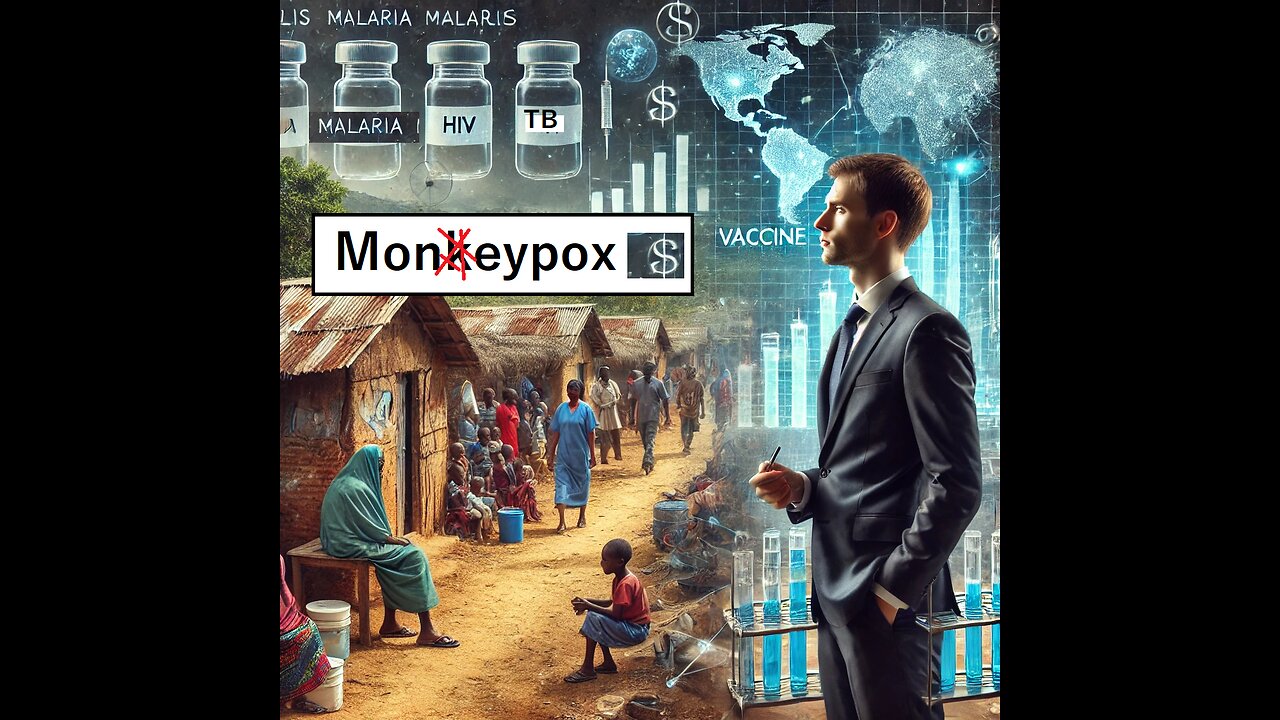Premium Only Content

Dr. David Bell: Mpox-alypse / WHO Vaccine Gold Rush
David Bell, MD, PhD, offered a striking critique of the modern public health landscape. As a seasoned physician and infectious disease expert with over 25 years of experience working in low-income countries, Bell provided a unique perspective on the shift toward vaccine-centered public health initiatives. His central argument is that diseases like TB, malaria, and HIV, which are responsible for a staggering death toll in the Third World, are being sidelined because they don’t have the glamour of a vaccine.
"We’ve allowed the (vaccine-) business model to become the driving force of international public health," Bell remarked. He notes that instead of focusing on systemic improvements like sanitation, nutrition, and living conditions, global health agencies and pharmaceutical companies have become obsessed with developing and selling vaccines for diseases, regardless of the actual public health need. "The large pharmaceutical companies and their investors have seen opportunities, particularly in vaccines," he continues, pointing out that selling vaccines to millions of people—most of whom aren’t at risk—has become an incredibly profitable model.
One of Bell’s key criticisms is the way public health resources are being diverted to diseases like Mpox (formerly monkeypox), while far deadlier diseases continue to ravage poorer countries. TB kills hundreds of thousands annually, while malaria claims thousands of lives each month. Yet, the world is more focused on producing millions of doses of Mpox vaccines for a disease with a relatively low fatality rate.
"Monkeypox has been around for 25-30 years, but it’s almost certainly thousands of years old," Bell notes, adding that its reservoir is in rodents, not monkeys, and it spreads primarily through close physical contact. Despite this, Mpox was declared a public health emergency of international concern, leading to a rush for vaccines that Bell sees as unnecessary. "Follow the money," he advises, emphasizing that this has less to do with public health and more to do with financial incentives. "Vaccines are a medication. They have benefits and risks, just like anything else."
Bell’s perspective stems from his years on the frontlines, where malaria, HIV, and TB have decimated populations. Unlike these chronic diseases, which require long-term strategies, vaccines offer a quick fix—and an even quicker profit. He questions why global health organizations and media outlets blow relatively small issues like Mpox into global crises while ignoring the ongoing disasters of diseases that claim far more lives.
In his view, the WHO has become complicit in this shift, largely due to its funding model. Bell explains that the organization's reliance on earmarked donations from countries with large pharmaceutical interests has shifted its focus. "The WHO is 80% funded by private donations, many from pharmaceutical companies," Bell says. This, he believes, explains why there’s a disproportionate emphasis on diseases that can be "solved" with vaccines, while more fundamental health issues like nutrition go unaddressed. "If they could make the same noise about basic nutrition support as they do about vaccines, we’d be in a much better place," Bell argues.
He sums up the current state of public health with a sharp observation: "Things aren’t getting worse in terms of disease. It’s just getting easier to make money out of it." This encapsulates Bell’s frustration with the industry’s direction. He isn’t against vaccines; rather, he is against the way they have come to dominate public health discourse at the expense of more pressing, long-term solutions.
As long as the focus remains on vaccine development, genuine public health emergencies—like those found in impoverished nations—will continue to be ignored. Follow the money has become the guiding principle, and until that changes, malaria, TB, and HIV will remain in the shadows, killing millions while the spotlight shines on diseases that fit the vaccine narrative.
#Vaccines #Mpox #PublicHealth #WHO #TB #Malaria #PharmaceuticalProfits #InfectiousDiseases #GlobalHealth #Monkeypox
-
 59:31
59:31
Squaring The Circle, A Randall Carlson Podcast
8 hours ago#039: How Politics & War, Art & Science Shape Our World; A Cultural Commentary From Randall Carlson
1.11K2 -
 13:21
13:21
Misha Petrov
8 hours agoThe CRINGIEST Thing I Have Ever Seen…
1.73K22 -
 11:45
11:45
BIG NEM
4 hours agoWe Blind Taste Tested the Best Jollof in Toronto 🇳🇬🇬🇭
28 -
 15:40
15:40
Fit'n Fire
7 hours agoArsenal SLR106f & LiteRaider AK Handguard from 1791 Industries
881 -
 8:34
8:34
Mike Rowe
6 days agoWhat You Didn't Hear At Pete's Confirmation Hearing | The Way I Heard It with Mike Rowe
33.1K18 -
 7:13:44
7:13:44
TonYGaMinG
9 hours ago🟢LATEST! KINGDOM COME DELIVERANCE 2 / NEW EMOTES / BLERPS #RumbleGaming
56.7K4 -
 40:17
40:17
SLS - Street League Skateboarding
4 days agoEVERY 9 CLUB IN FLORIDA! Looking back at SLS Jacksonville 2021 & 2022 - Yuto, Jagger, Sora & more...
101K1 -
 2:00:47
2:00:47
PaddysParlorGames
18 hours agoSunday Parlor Chill: GOBSTEIN
56.1K3 -
 LIVE
LIVE
Major League Fishing
5 days agoLIVE! - Bass Pro Tour: Stage 2 - Day 4
146 watching -
 56:24
56:24
Russell Brand
1 day agoEddie Gallagher: War, Betrayal & Fighting the System
117K13